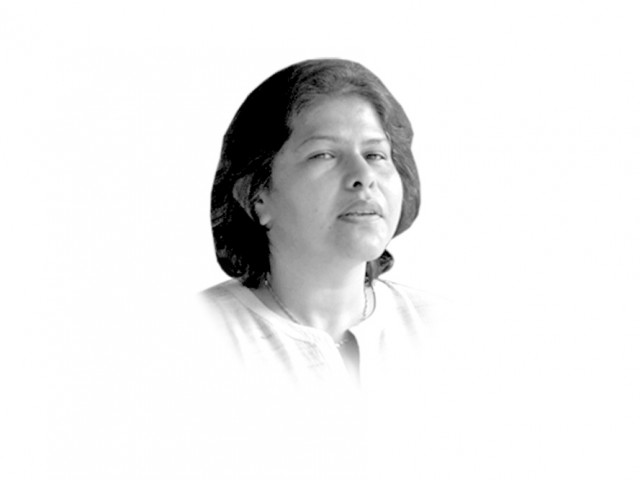How to make the elephant dance
Nawaz must remember that this time, there is little room for taking odd shortcuts for increasing his relative power.

The writer is an independent social scientist and author of Military Inc.
This is not Chile and Musharraf is no Augusto Pinochet. Ultimately, a lot of Pakistanis, especially in Punjab, which has the bulk of population, will not really sympathise with a derailment of the political process if it is seen as being caused by a civilian leader. Prior to elections, I had heard many a people invoke caution in voting for the PML-N, arguing that since Nawaz Sharif’s ascendency to power will most certainly result in a clash between him and the armed forces, it would be a better idea to not vote for him or contain his election victory. The majority would rather believe that the military has conceded space and we look like a healthy democracy even if it were a lie.
In Chile, on the other hand, there was large-scale support for trying Pinochet and punishing him for his brutality. His military was not professional and hence less adept at hiding its sins. Had it brutalised people selectively it would not have fallen out with the Chilean society at large. Selective brutality is relatively easier to hide and is under-reported through careful manipulation of the media. In any case, opening up the front right at the beginning would mean that the establishment might unleash the power of the media against the Sharif government.
Moreover, there are bigger battles to fight at the moment than Pervez Musharraf. The new prime minister has indicated his will to be the boss as laid down in the 1973 Constitution. This means that he will have to devise a strategic plan to negotiate with the military and find ways to curtail the institution’s power. Restoring some amount of institutionalism in the armed forces through appointing the senior most as the service chief will certainly be a healthy beginning. In the past, political leaders were too keen to play the game of the most loyal. Such a formula always proved risky.
A glance at the literature on civil-military relations (CMR), particularly some of the work by renowned political scientist and CMR expert Alfred Stepan, shows that power has to be negotiated gently with the military. The armed forces’ ability to control and exact violence makes them a critical member of the elite. They would never negotiate on their critical interests. For instance, the command and control of their organisation or any part of it (including an intelligence set-up) is non-negotiable, especially in a democracy in transition. That the prime minister is the ultimate boss is easier said than done particularly in an environment where civilians hardly have a capacity to challenge the military’s strength.
The fact that the army leadership has visited Mian Nawaz Sharif at his residence, or that the military is willing to give briefings to the parliament should be seen in context. The PML-N chief may not be the immediate beneficiary but he has to begin building civilian capacity to negotiate political space. This can only be done through rationalising and restructuring the Ministry of Defence to meet the standards envisioned in the original paper conceived during the early 1970s. The first secretary defence appointed by Zulfikar Ali Bhutto was not even a civilian bureaucrat but a gentleman from the private sector. Subsequently, civilian bureaucrats ran the ministry with the help of some military bureaucrats who were placed in certain positions to build understanding between civil and military. This situation persisted even during Ziaul Haq’s period. It was during the 1990s that serving or senior retired military officers were appointed as secretary defence. This must change and so should the appointment of senior military officers as additional secretaries. However, for such restructuring, the government would have to build the capacity of its civilian bureaucracy. Perhaps, even designate defence bureaucracy as a special service group in which officers are groomed for the work and their expertise built.
The various committees of the parliament on defence (also foreign affairs) would have to be re-energised. This includes the Cabinet Committee for Defence and the Defence Council. The parliament could also establish a think tank or a group of experts that could continuously provide input to the parliament and, hopefully, counter information and argument. It is critical for the parliament to access alternative source of information and perspective to build its capacity. The Senate Special Committee on Defence’s method of conducting tutorials for its members in a room filled mostly with students from military-controlled universities and passed off as public hearings must be replaced with a better method to educate and empower parliamentarians.
Mian Nawaz Sharif had also mentioned instituting a Kargil Commission and presenting the report by the Abbotabad Commission. He must certainly disclose the latter. The former he could use to negotiate on other policy areas like regional peace.
But most importantly, Mian Nawaz Sharif must remember that this time, there is little room for taking odd shortcuts for increasing his relative power. Of course, making extraordinary compromises or giving excessive sweeteners will not work. He ought to have a team with special ears and eyes to make the elephant dance.
Published in The Express Tribune, May 23rd, 2013.














COMMENTS
Comments are moderated and generally will be posted if they are on-topic and not abusive.
For more information, please see our Comments FAQ